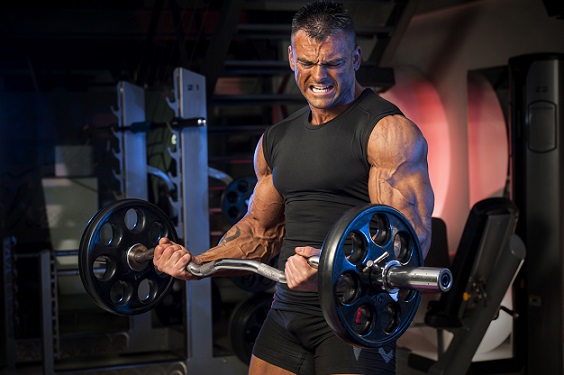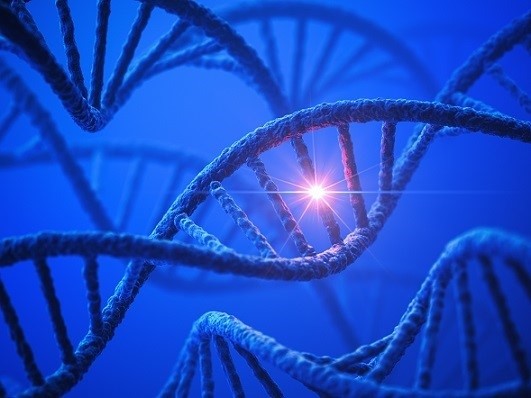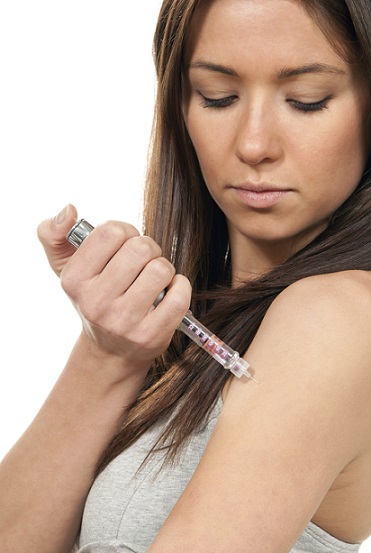 There’s a lot of misconception out there about the role of hormones in the creation of acne. The first thing you need to know is that they do play a huge role, after all you don’t see six year old kids getting acne much.
There’s a lot of misconception out there about the role of hormones in the creation of acne. The first thing you need to know is that they do play a huge role, after all you don’t see six year old kids getting acne much.
The reason why acne first pops up in your teenage years is because that’s when your hormones first become active and that’s also when they are fluctuating like crazy.
However it is completely wrong to suggest that having high levels of these hormones dooms you to acne. In fact you can have high levels of androgens and also perfectly clear skin. Here’s why…
Which hormones are involved? What do they do?
 First you need to understand the basics of how hormones affect acne. The basic situation which causes acne in the vast majority of cases is as follows: your skin pores get blocked, that allows p.acnes bacteria to flood in, your body launches an overly powerful response to that bacteria, and your pore swells up to become a pimple.
First you need to understand the basics of how hormones affect acne. The basic situation which causes acne in the vast majority of cases is as follows: your skin pores get blocked, that allows p.acnes bacteria to flood in, your body launches an overly powerful response to that bacteria, and your pore swells up to become a pimple.
There are alternative routes for the creation of acne, but this accounts for the vast majority of cases. The key point is that blocked skin pores are almost always involved and that’s where hormones come in.
Having excessive levels of the wrong sort can dramatically increase your sebum production and make it far more likely that your skin pores will get blocked. Do you have any friends who don’t have the slightest bit of oil on their skin and also don’t have any blackheads or other blocked pores? The reason why is that they have both stable and low levels of the right hormones.
Read Annihilate Your Acne – learn to prevent acne and stop just treating it!
Hormones don’t influence too much else; they are not an important cause of inflammation, for example. However their role in increasing sebum production is enormous and that makes it extremely important that you get them under control.
The very most important hormones are…
DHT – dihydrotestosterone, also known as DHT, is an androgenic hormone. Men have far higher levels of it than women and it is responsible for masculine characteristics such as a deep voice, a high sex drive, body hair, body odour, and all sorts of things. The function we are concerned with is its potent ability to stimulate the sebaceous glands in our skin.
Your sebaceous glands are what produce the sebum on your face and when DHT binds to androgen receptors in them, it causes the glands to produce higher amounts of sebum. The higher the amount of DHT in your body, the more sebum gets produced.
While browsing the internet you might have noticed all sorts of herbs and plants that promise to reduce DHT in your body, and this is why they’re so popular. Saw palmetto is one example of those herbal remedies.
Testosterone – the granddad of androgenic hormones, testosterone gets a huge focus in the acne community because it is by far the most famous androgen.
When people think of the word testosterone, they think of hulking muscles, aggressive behaviour, oily skin, body odour, body hair, and all the classic masculine characteristics.
However, the truth is that testosterone itself does not directly cause many of those characteristics. DHT is the main player; it is the androgen that stimulates body hair, it stimulates a man’s sex drive, and importantly for us, it stimulates the sebaceous glands. All testosterone stimulates is muscle receptors; in other words it is only responsible for building up your muscles.
However testosterone is still very important for acne because it is what creates DHT in the first place. All DHT in your body is manufactured from testosterone using the 5-alpha reductase enzyme. Therefore no testosterone also equals no DHT.
The top 6 vitamins and minerals for clearing acne forever
Inhibiting this conversion is actually the key plank of anti-DHT regimens; they don’t try to directly reduce DHT, they try to inhibit 5-alpa reductase and thus prevent DHT from ever being created in the first place.
Insulin – this isn’t a hormone that people would initially suspect is involved with acne, as it is most famous as a treatment for diabetics. However it is actually the MOST important hormone for acne. Insulin’s function in the body is to shuttle nutrients into your various cells. It’s most important function is to process the carbohydrates you eat in your diet.
Every single carbohydrate you eat will eventually get converted into glucose – the type of sugar in your blood. Starchy potatoes break down into glucose, and a slice of sugary cake will become glucose as well. Therefore eating carbohydrates causes an increase in blood sugar and this is what gets insulin involved. Insulin is required for converting this excess glucose into energy and it does just that; it first converts the blood sugar into glycogen, an easily usable form of energy, and then it shuttles off this glycogen into your glycogen stores. There it is ready to be used by you when you walk, cycle, lift weights, or exercise in any way.
However there’s a big problem; many of us eat far too many carbohydrates and don’t get enough exercise. This means that your glycogen stores get full and unable to accept much more glycogen. To stop insulin from pushing more glycogen in, the stores become insulin resistant, meaning that insulin does not work as well on them.
It’s not healthy to have excess levels of glucose in your bloodstream. Therefore your body responds by pumping out higher levels of insulin, in order to cram as much glucose into the stores as possible. The cycle continues and continues; your stores get more insulin resistant, and your body has to create ever higher amounts of insulin.
The problem with all this is that high levels of insulin are a disaster for anyone trying to get clear skin. Insulin is twice as much of a villain as androgens; not only does it stimulate your sebaceous glands in the same way they do, but it also enhances the ability of other androgens to do the same.
Recommended – the 7 greatest natural topical treatments for acne
Having high levels of insulin gives you a double whammy of acne, so it’s very important to keep it low. That also means that having high levels of DHT or testosterone is nowhere near as problematic if you simply keep your insulin low.
For those reasons insulin should be the main focus of your hormonal acne efforts.
IGF-1 – this stands for insulin-like growth factor. IGF-1 is a highly anabolic hormone that is most commonly associated with bodybuilders. Have you ever seen or met a bodybuilder that was consuming vast quantities of milk in order to build muscle? He was doing it due to its high IGF-1 content. IGF-1 helps to build muscle but like DHT, it can also cause high sebum production.
IGF-1 is very closely correlated with insulin; the more insulin you have, the more IGF-1 there will be in turn. Therefore you can sort out the problem of IGF-1 with the same strategies you use to keep insulin low. Also note that IGF-1 is not an evil hormone; temporary spikes are perfectly acceptable and are important for building muscle. The problem is constantly elevated levels, which are a nightmare for your skin and aren’t even useful for bodybuilding purposes.
So the basic implication of all this is that having high levels of these hormones will lead to extremely oily skin, and that will guarantee blocked pores. However that doesn’t mean that you have to focus on all of them. Here’s what you should do:
The ultimate hormone strategy for acne
 My recommended strategy is that everyone should focus on their insulin levels, and that women should also focus on their DHT levels.
My recommended strategy is that everyone should focus on their insulin levels, and that women should also focus on their DHT levels.
First let’s deal with insulin; it is massively important to deal with because it affects your acne in three different ways. It increases sebum itself, it creates IGF-1 and it also makes androgens a lot more damaging.
Therefore if you keep insulin low, you can actually have high DHT or testosterone and not necessarily have ridiculously oily skin.
Reducing insulin is also fairly simple in most cases; the basic strategy is to use up your glycogen stores, make them less resistant to insulin, and thus reduce the need for high insulin in the first place.
To accomplish that you can eat less carbohydrates and get more exercise. Out of all these hormones reducing insulin will have the broadest effects.
Why zinc supplements can reduce acne by 49.8%
Unlike androgens, having high insulin doesn’t benefit your life in any way. Androgens may be associated with acne, but for men they are extremely important. They are necessary for a man’s sex drive, for his mental abilities (lack of androgens can cause brain fog), and energy levels. They are needed to build solid muscle mass and they are also needed to burn fat.
In short, without at least decent levels of androgens a man would not have much of a life at all; that’s why I recommend that you don’t try to reduce androgens if you’re male. Insulin, on the other hand, does not have those benefits. High levels of insulin cause all sorts of other problems, most notably diabetes. It’s interesting that the root causes of diabetes and acne are actually extremely similar; both are due to insulin resistance.
Therefore, if you have to choose between a hormone that will make you obese, cause premature death, and put you at risk of limb amputation, and a hormone that guarantees a life full of virility, it’s a no brainer which you would reduce. Androgens don’t have to stimulate as much sebum production anyway, if you keep your insulin levels low.
Also, if your insulin gets fairly low but your androgens are still high, then you might still have fairly oily skin, but that doesn’t have to be a problem.
The main problem with high sebum production is that it makes it more likely that some of it will oxidise, and that’s the main reason why pores get blocked. This can be prevented by getting enough antioxidants.
Therefore, even if your skin is still fairly oily, eating a healthy diet can make sure that this doesn’t cause acne. Eating lots of oregano is a good way to mitigate the damage. If you had high insulin levels and high androgens then getting enough antioxidants would be impossible, but with only androgens being high you could easily manage it.
Should women reduce androgens?
The question of DHT and testosterone is not nearly the same for women because those hormones are not as important for them. As you probably know, a woman’s primary sex hormone is estrogen. Women do have low levels of androgens but they do not provide women with the same advantages that men get.
Therefore, while I recommend that men should not bother to reduce androgens, I recommend that women certainly should. If you’re a woman then you can make good use of DHT inhibiting substances like saw palmetto. Also note that women are far more sensitive to the effects of androgens; they need a lot less than a man to get oil gushing off of their face.
Therefore if you’re a woman you have more options because you can reduce both insulin and androgens. If you focus on both of them, the reduction in sebum production could be huge.
Don’t forget genetics
 Another thing you need to know is that a large part of sebum production is under genetic control.
Another thing you need to know is that a large part of sebum production is under genetic control.
Studies on identical twins have found that their levels of sebum production are very similar. Therefore even if you keep your insulin levels down, you still might have fairly high sebum production.
If that’s the case then you shouldn’t embark on any extreme quests to get your sebum lower, as it’s something you’ll have to live with. It’s actually not much of a problem anyway; as we discussed earlier you can negate the problems of a certain level of sebum production by getting enough antioxidants.
If you have genetically high sebum production then you will have to eat more fruits (such as strawberries), vegetables, herbs and spices than those who don’t.
Eat lots of cinnamon: an unlikely but top-notch hormonal strategy
The good news is that EVERYONE will be able to generate at least some improvement. High insulin levels are extremely common in the West today, which is why diabetes is common these days.
Therefore it’s likely that you too have at least above average levels and thus you can make good progress by reducing them.
Conclusion
Hormones are an extremely important cause of acne. Insulin, IGF-1, testosterone, and DHT all cause your skin to produce higher levels of sebum, which blocks your pores. However they don’t guarantee acne; you can easily control these hormones and mitigate the damage they do.
My recommendation is that if you’re a man, you focus on reducing insulin, and if you’re a woman, you focus on reducing both androgens and insulin. Also, one of the reasons why people don’t like to think that hormones are involved with acne is that they think those hormones are out of their control. Fortunately that’s nonsense; you can easily control them and thus you can control your sebum production.
The results from controlling hormones will not be instantaneous. Insulin, for example, cannot be reduced overnight. It takes a while to sort out the problem of insulin resistance and thus bring the levels down. When you do sort it out however, you will be able to achieve some truly excellent results.
If you then use these strategies in combination with others such as reducing chronic inflammation, your acne will not stand a chance.
NEXT: read the 167 page eBook and get the ultimate diet for acne
Thanks for reading!
